BY ISADORA ZUCKER ’25
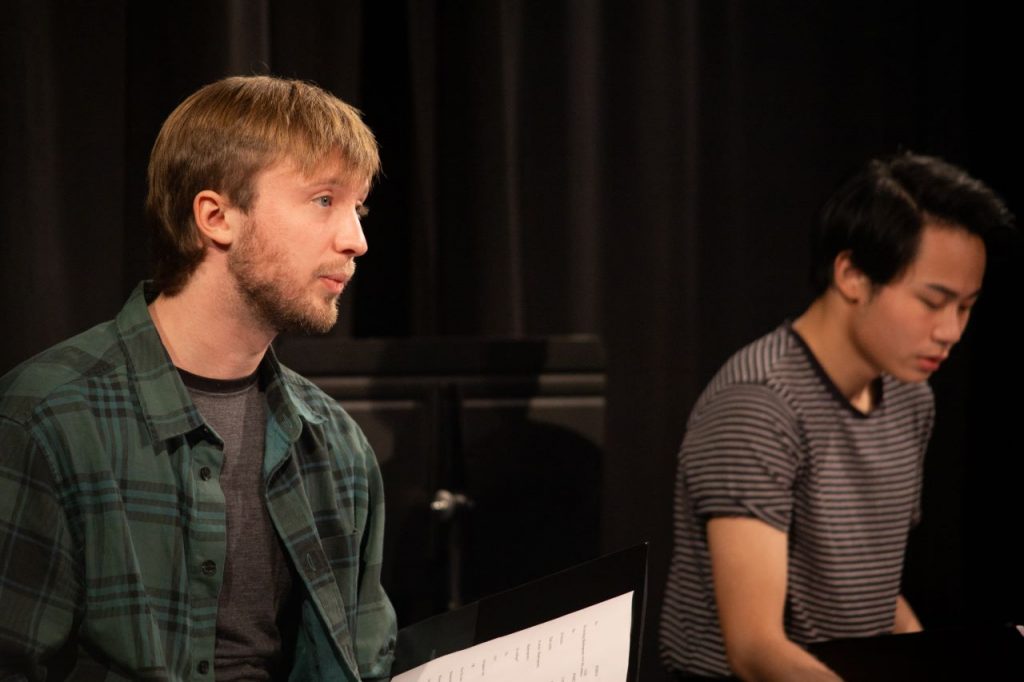
An odd phenomenon occurred during the COVID-19 lockdown; while the world was in uproar, and socio-political issues were straining an already dangerously divided country, there was a unique type of freedom that isolation allowed. Many people were given space to explore different parts of themselves, free from the often scathing judgment of society. This exploration of identity was widely seen in the LGBTQ+ community as people were allowed a year to self-reflect without the input of the rest of the world. Reyn Ricafort (‘25) explored this in his play The Year It Stops, which had readings on October 10th and November 20th in Skidmore Theater’s Studio A. The two-person play explores the dynamic between Luis—an openly gay, Asian-American man—and Joshua—a white man questioning his sexuality—as they meet up after the period of lockdown.
The show opens with Luis, played by Ricafort, as he assembles the stage and then proceeds to fall asleep. He wakes up with a cry, stirring from what can be assumed to be a nightmare, then gets up to sit in one seat of the car. Joshua, played by Jimmy Katzman (‘25) then enters, taking the other seat. They begin to share slightly tense small talk; the fragmented way in which this opening dialogue is written makes it feel more like a text conversation than one between two people, a nod to the limited in-person socialization that was possible at the time. Through the opening dialogue, we learn both Joshua and Luis attended the same high school, though a year apart, and that this is the first time Joshua has tried seeing a man romantically. Luis begins to lightheartedly pry for more information, asking what made Joshua decide to finally explore what he was calling a “glitch” on his dating app. At this point, the dialogue shifts to a more conversational style, indicating that the characters are having an unmasking moment of sorts. While Luis appears comfortable talking about the topic of sexuality—even joking about putting on a wig to make it easier for the other—Joshua gets progressively more panicked, eventually leaving the car after Luis tells him to “just say it” regarding his sexual identity. Before Joshua fully exits, Luis apologizes and admits that Joshua is the first person he has seen since lockdown. Joshua pauses outside, and we learn the same is true for him. The conversation begins again, both of them sharing that their parents had been laid off because of the pandemic, leading Joshua to re-enter the car.
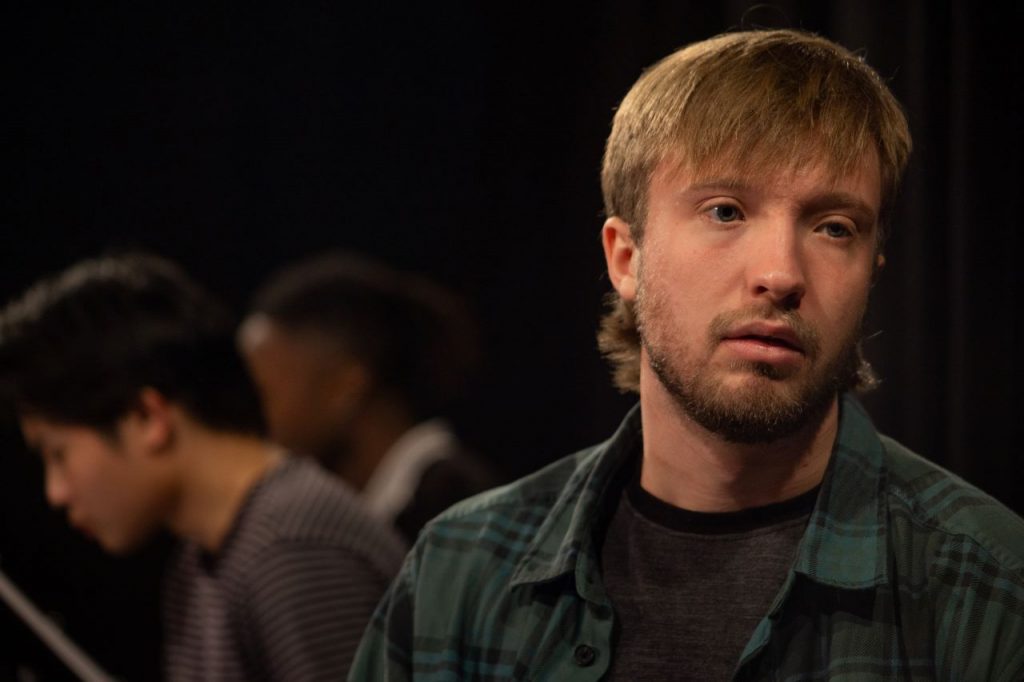
There is a beauty in the way the setting of the car is used throughout the play, becoming a sort of peaceful distortion of reality shared just by the two of them. Once Joshua settles back in, Luis withdraws mentally for a second, absentmindedly saying “driving down the highway at full speed.” This imagery of reckless driving in what has become a sort of protected space for the two of them stands out as such a
paradoxical idea and is a theme that is returned to later in the show. The mood then shifts when Luis asks Joshua to slow dance. Joshua at first assumes it to be another absentminded comment until Luis explains that prom was supposed to be held that night before it was canceled because of COVID. Once dancing, their conversation begins to become sparse, and the two eventually share a kiss, closing out the first scene of the show.
Scene two begins with Luis and Joshua slow-dancing after a few months have passed. The two seem to have fallen into a comfortable state of intimacy with each which Joshua disrupts when he coughs, causing Luis to push him away. Though Joshua assures Luis that he has tested negative, Luis nonetheless begins to spiral, fearing that he is asymptomatic and will infect his family. As he begins to panic, Joshua makes a snide remark about what he perceives to be the overdramatization of the virus by journalists. Luis defends the validity of this information, but Joshua continues to share his distrust of the media, claiming news outlets are using their power to unfairly control the masses; he expresses frustration over the fact that “They are telling us to cover our faces and stand nine feet apart” and that the protests for the BLM movement weren’t there “to fuck shit up when they took away our jobs.” This moment is when we begin to see a shift in the show, revealing the deeper dynamics at play between these two characters. While Luiz continues to defend his stance, pointing out that Joshua is misinformed and should be respecting the news and guidelines about COVID-19, Joshua responds with the line “Hey, my body my choice right?” The twisting of that phrase sent a stillness through the audience, the room suddenly highly aware of the power dynamic being displayed in front of them.
The two begin to spiral—each ignoring the other and talking themselves into a deeper state of agitation—which continues until Joshua simply states that he wishes everything could return back to normal. Joshua’s sentiment breaks both of them out of their own heads, and the discussion turns into an argument. It is revealed that Joshua’s frustrations stem from a fear of not being able to provide for his family, as their restaurant shut down due to the pandemic. While recognizing that people are dying, Joshua is under the assumption that the lockdown will cause more death and harm, especially in his personal life, than the spread of the virus would without any government mandates. Ricafort’s writing truly shines in these scenes—while the greater message of the play is generally in disagreement with Joshua’s viewpoints, he was not written as a one-sided stereotype. The audience empathizes with Joshua because his views emanate from a place of kindness and love for his family, despite how they may have been twisted by the misinformation he has been fed.
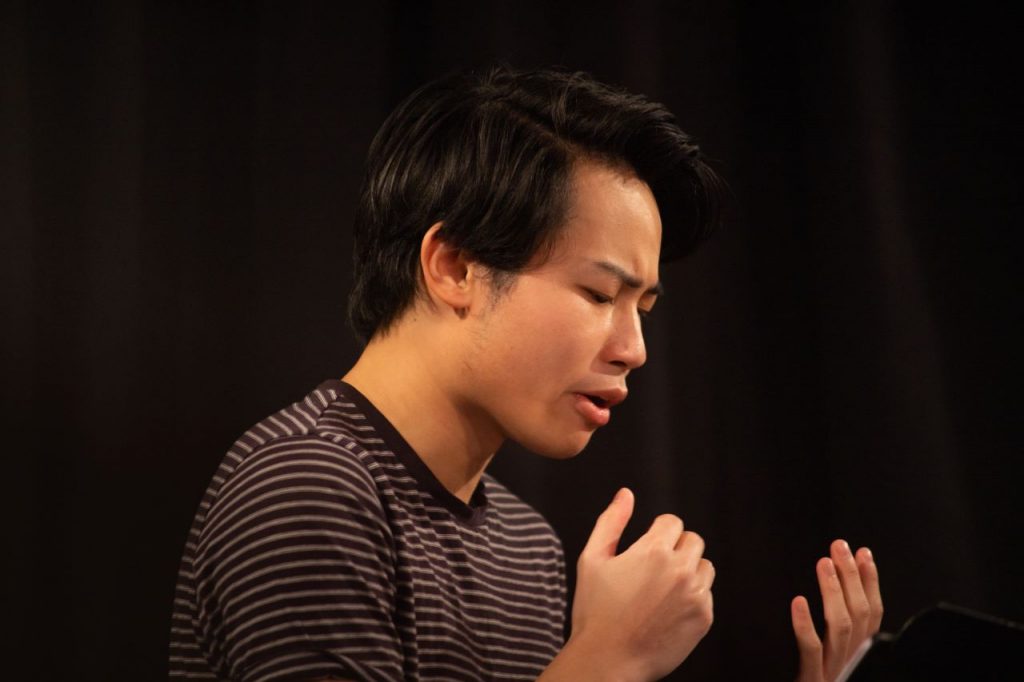
Luis begins to dig deeper into Joshua’s views and realizes that the other seems to agree with common far-right talking points. From masking politics to the protestors, Joshua and Luis stand on opposing sides. The argument continues to escalate, with Joshua feeling like he and his family have been unfairly overlooked by society, while Luis tries to emphasize how institutionalized racism has oppressed people in far more violent ways for longer. A breaking point is reached when Joshua claims that it may be a good thing Luis’ “people” are oppressed because it will motivate them to “stop being lazy and do something about it” instead of just “complain[ing]”. Luis delivers a powerful monologue, angrily proclaiming the world had already stopped, far before the quarantine, for everyone but Joshua and people like him. How lives had been destroyed and towns erased just so he could live in unaware comfort. He continues to
explain that Joshua is not the first “straight” man he has given a chance, but that they all end up the same. The car metaphor returns, with Luis saying he always stops the car for men like Joshua, only because he fears what would happen if he kept driving with reckless abandon in search of something he isn’t even sure is there.
After a silence, Joshua begins to speak again. He talks about his high school girlfriend, and how they were together for so many years but he always had a feeling of missing something, even though he truly did love her. Luis asks if he still feels that out-of-reach longing and Joshua shares that he doesn’t, not when the two of them are together. Joshua apologizes—both for the conversation they just had and for the homophobia he showed towards Luis in high school—telling him (Luis) that he will be there for him and listen to anything he needs to say, even if he disagrees. After a moment of silence, and an unsure look, Luis suggests they slow dance again, but before they can start, Joshua pulls him into a kiss. The act ends as the two continue kissing, while new reports about the development of vaccines and recent acts of hate play in the background.
Act two opens with the two of them once again slow dancing, interrupted by an alarm on Luis’ phone. In a slight role reversal, Joshua asks to continue slow dancing, while Luis insists he’s already stayed later than he should have. Luis, while reluctant to leave, is pressed for time; he is leaving for college the next day, though he reassures Joshua that he will come back in two weeks for his birthday. The two have clearly grown far closer to each other since the last act, with Joshua lightheartedly insisting he deserves a full day to spend with Luis when he gets back. Upon this request, Luis asks if they could visit the nearby city together, confessing that he’s never been on a real date before and just wants to see what it’s like at least once. Joshua is hesitant, and Luis quickly withdraws both the offer and himself. As he moves to leave the
car, Joshua grabs Luis’ hand as an act of reassurance for Luis and himself. Joshua asks Luis if he’d like to meet at the train station in the city. Luis, in a state of slight disbelief, asks Joshua to promise, which he does, before kissing him goodbye and exiting the car.
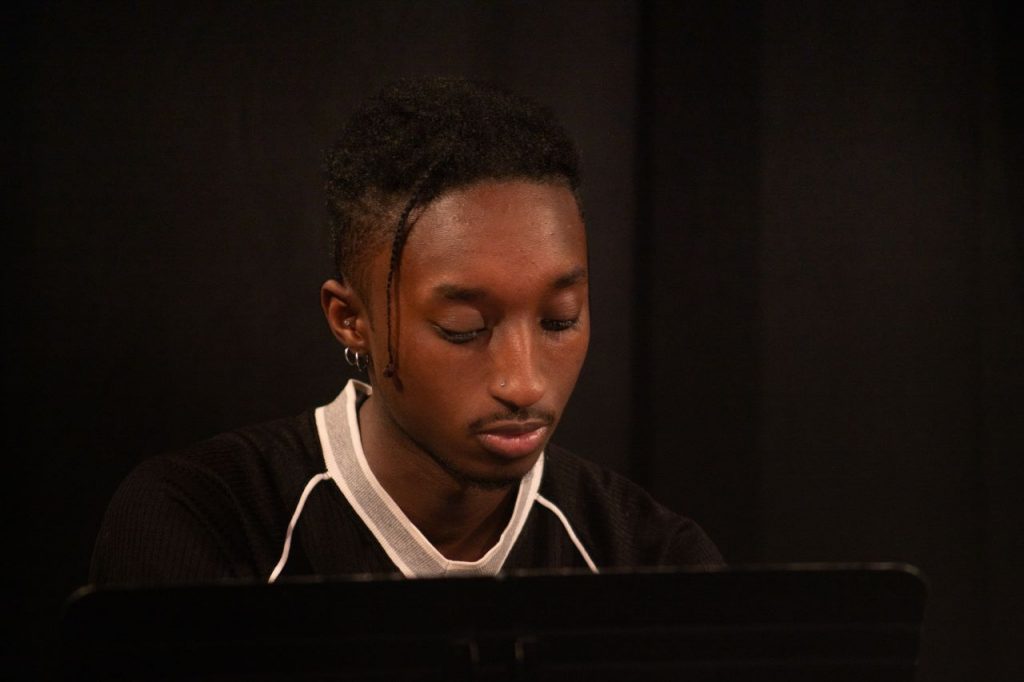
The second scene of Act Two begins with Joshua on stage while more news reports play in the background. He paces around, appearing anxious as train sounds start to filter in with news stories. The sounds crescendo into a large static that intermittently switches to silence, continuing to do so until a loud train sound and bright light fill the stage. A singular news story, spoken by narrator Jacobs (‘24), details a young Asian-American man being pushed onto the train tracks at a Boston train station in what seemed to be a racially-motivated act. Joshua pleads for the news report to end, but it continues, finishing with eyewitnesses claiming that the young man appeared to be waiting for someone at the station just before the incident occurred. There is a long period of silence after this, as Joshua makes his way back into the car in a slight daze. Luis walks on stage hesitantly, and slowly enters the car to sit beside Joshua. They begin to speak, though how they converse reverts back to the more sterile language that was used at the beginning of the show. Through the sparse conversation, the audience learns that it has been over a year since Luis was pushed onto the tracks, with the two of them not having spoken since then. They settle into an uncomfortable silence which Joshua eventually breaks when he claims that he intended to get on the train, but was stopped by his fear of being public about his sexuality. Joshua tells Luis that if he could go back in time, he would have gotten on the train. Luis is unimpressed with the declaration and details the moments leading up to the incident; how he had waited for Joshua to come out of one of the trains despite knowing deep down that he wasn’t ready. Luis admits that he remembered jumping onto the tracks himself rather than being pushed. It wasn’t until a few weeks later when he woke up in the hospital that he found out the truth.
Joshua, still in slight shock, blames himself for what happened and reaches for Luis’ hand. Luis initially pulls away and berates Joshua for his pity, until Joshua eventually grabs Luis’ hand. At that moment, the hardened facade Luis was putting up melts away, as he asks Joshua where he was over and over again
while Joshua continues to say he’s sorry. Eventually, Joshua stops apologizing and assures Luis “I’m here. I’m here now.” After another beat of silence, Luis gets up to leave, telling Joshua he can’t stay in the car nor does he want to. Joshua pleads for him to stay, and as this back and forth escalates, Joshua eventually
admits that Luis is the thing he was constantly reaching for, a reference to their earlier conversation about Joshua’s lack of satisfaction in his life. Getting down on his knees, Joshua explains that the feeling of something missing in his life stopped whenever he was with Luis, expressing his reluctance to go back to “how [he] felt before” Luis now that “[he] know[s] what it’s like.” The blocking at this moment stood out to me, as this is the first time I felt the power dynamic truly shift in the show: Luis, looking down at a pleading Joshua. Instead of using that power maliciously, Luis kneels in front of Joshua and extends a show of compassion and understanding that the audience understands was never given to him (Luis) by another man.
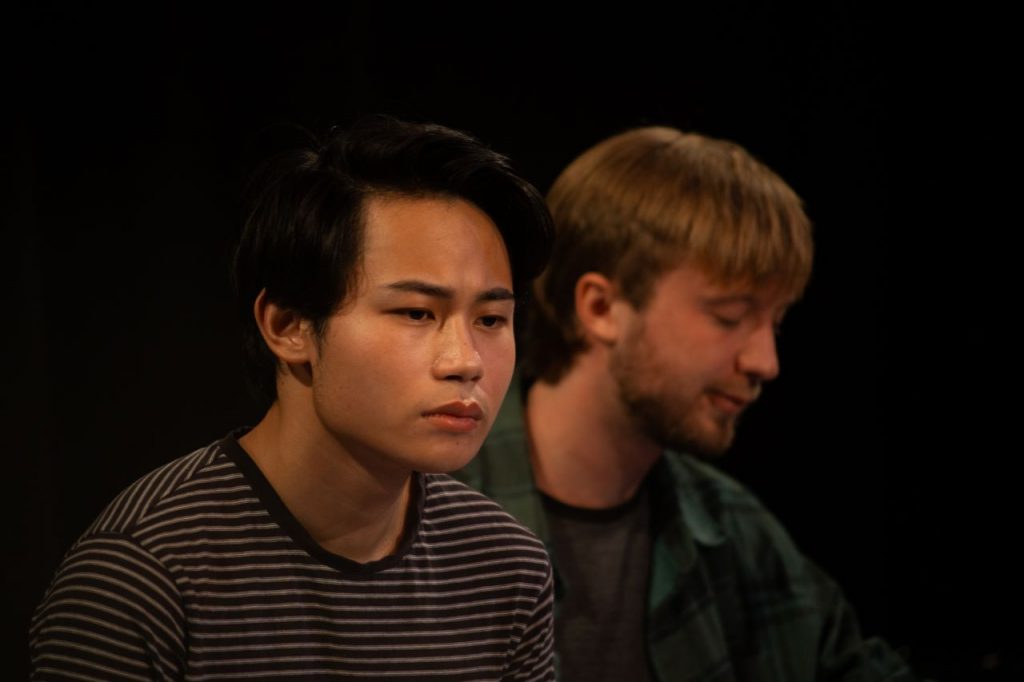
On the floor, Luis details the experience of waking up and realizing the number of people who’d put a pause in their own lives to show support for him. Luis brings up the car metaphor again, acknowledging that for so many years he had only stopped it for other people expecting others to do the same for him. It was only a matter of time before it got to a point where Luis was metaphorically and physically driving recklessly toward something that was always just out of reach. Only when waking up did he realize that what he was searching for was not another person, but himself; Luis needed to stop for himself. Luis then flips the metaphor and tells Joshua that what he truly needs is himself, not Luis, no matter how vital or integral this process of searching is to the inevitable conclusion of realizing that happiness is conditional upon being able to find love in oneself. While a lost and disillusioned Joshua rejects Luis’s words, Luis is steadfast in his reasoning. At this point in the show, both actors put down their scripts and recite the final lines by memory, drawing focus to the story’s final image. Luis makes Joshua promise that he will continue to look for himself no matter how painful and confusing the process may be, to which Joshua initially says no. Luis, however, is dedicated to making sure Joshua doesn’t make the same mistakes that he did and attempts to instill the importance of his advice one last time through a forceful “promise me”. Joshua eventually acquiesces and makes the promise to Luis.
Just as Luis is about to exit the car, Joshua calls him back to say “I’ll see you”. Luis repeats those very same words, before eventually leaving Joshua by himself on the stage. The play ends with news reports of the world’s slow but gradual improvement as COVID restrictions lift and society reflects on the ways it can improve itself moving forward.
The Year It Stops is a beautiful exploration of self-discovery and the various ways the COVID pandemic changed how we view ourselves and each other. Ricafort did an incredible job revealing the deep complexities behind his characters, while all the actors involved gave truly moving performances and brought the play to life.
Photos by Coltrane Cho ’24
***
Isadora Zucker ’25 is a staff writer for the Skidmore Theater Living Newsletter
